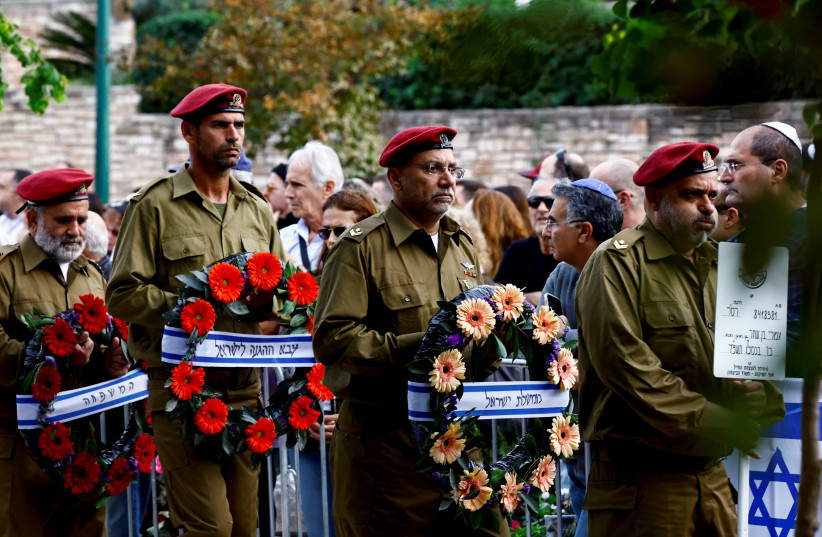Recently, yet again, we abutted bereavement when we attended a “Life’s Door” event in Jerusalem, featuring Sarit Zussman, the mother of 22-year-old Ben, who recently fell in the Gazan war.
The organization, whose reason for being is to foster the idea of HOPE in adversity, invited Sarit because she is a shining beacon in the dark, swirling ocean of our current reality.
The many invited guests listened spellbound to this petite, seemingly fragile woman. From the moment she began to speak, we understood the towering strength of her persona, the depth of her value-based ethos, and the eloquence of her quiet dignity, all of which have so sadly been amplified by her tragic circumstance.
Like most Israelis since October 7, we gravitate toward families who have sacrificed the blood and breath of their dear ones in the cause of our collective and individual lives, both physical and spiritual.
The bravery of those lost in battle
We listen in stunned awe as they relate stories of the bravery and responsibility, the pranks, and the humanity of those killed in battle.

With a few stark exceptions, I have not heard expressions of hate or calls for revenge at these events, but rather contemplation and introspection. A principal, recurring question that the bereaved ask is, “How can we – how can I – act, so that we may be worthy of the great sacrifice of our kin?”
We flock in droves, in the hundreds, from the geographical and political and religious arc of the country, left, right and center, all coming to pay homage.
We stand in long, meandering, whispering human lines at funerals, shiva houses, and memorial events, inching towards the grieving families.
Far from formal, orchestrated processionals, these lines, born of a spontaneous, deeply felt outpouring of admiration and esteem for our slain, take desultory shape.
Links in a singular chain, we are a succession of interconnected loops winding through the fields and towns of our country and way beyond, crossing oceans, linking Jews across the continents, connecting us all: together, beyachad.
And while each component appears to have a unique identity and character, zooming out, the big picture reveals a rich continuum of collective memory and shared destiny.
WHEN QUEEN ELIZABETH died in September 2022, her opulent flag-draped coffin “lay in state” at Westminster Hall for five days as streams of people passed by to pay tribute.
The pomp, ceremony, and order surrounding this rare event were monumental, the antithesis of the Israeli experience. Israel has not had a monarch for millennia. We are a rough-and-tumble democracy with a largely nominal president.
Yet in these places of profound grief, I have an overwhelming sense that I stand in the presence of royalty.
In its prime usage, the term royalty is associated with privilege. The term “royalties,” payments for the right of use of patents, etc., is derived from the entitlement of the nobility of yore to demand bounty for the use of their land and the like.
In stark contrast, the eminence we encounter in these fraught times stems not from the right to take but rather from the willingness to give without question or boundary. Dictionary.com has an ancillary definition of the word royalty: “dignity or power.” Herein lies our nation’s true nobility. It is vested in those like the Zussman family, who display a depth of courage and commitment that empowers and compels them to action.
My generation (due disclosure: I am 68 years old) witnessed seminal, inspirational events like the Six Day War, the Yom Kippur War, and Entebbe, with the Holocaust and the Declaration of Independence on the tongues of our parents.
Moving to Israel in the 1980s involved a decision to move to a Third World country in order to be present at a unique moment of destiny for our people.
In contrast, the current generation of young Israelis has grown up at a time of material privilege in a thriving socioeconomic powerhouse.
Yet when the great disaster struck our country, our youngsters revealed themselves as a hidden treasure that is part of the ancient DNA that makes us an eternal people, rising in service and sacrifice for their land and their people.
We have been beneficiaries of the splendor of their spirit. So many have given their lives to this call, their names forevermore etched on an imperial roll of honor.
It is not just our combat soldiers and others who serve who wear that crown. Wives and children, parents, siblings, grandparents, volunteers, et al, make up the court of a majestic order, its roots dating back, way beyond the titular monarchies of today.
Rather than being educated at posh colleges and campuses, our aristocracy has been schooled by their parents and teachers, who themselves were raised in an environment of connection, commitment, and caring.
Sarit Zussman described her son’s sense of destiny, as well as her vision and mission to heal and renew a troubled nation. Hers is a majestic response to great tragedy.
Instead of fine linens of purple, blue, and crimson, our princes and princesses proudly wear a drab green. Our symbols of power are not scepters and golden orbs, but the worthy words of Sarit Zussman and so many others.
Our crown jewels are those magnificent people who continue to give so much of themselves so that we may live as sovereigns in our country and that our brethren overseas may have a home to return to.
Rather than elevating themselves to thrones of power, they raise us up from the depths of despair.
With these glittering exemplars, who needs kings and queens?
The writer dedicates this piece to Prof. Ben Corn, co-founder and executive chairman of Life’s Door, and to Dr. Woolfie Solomon.
